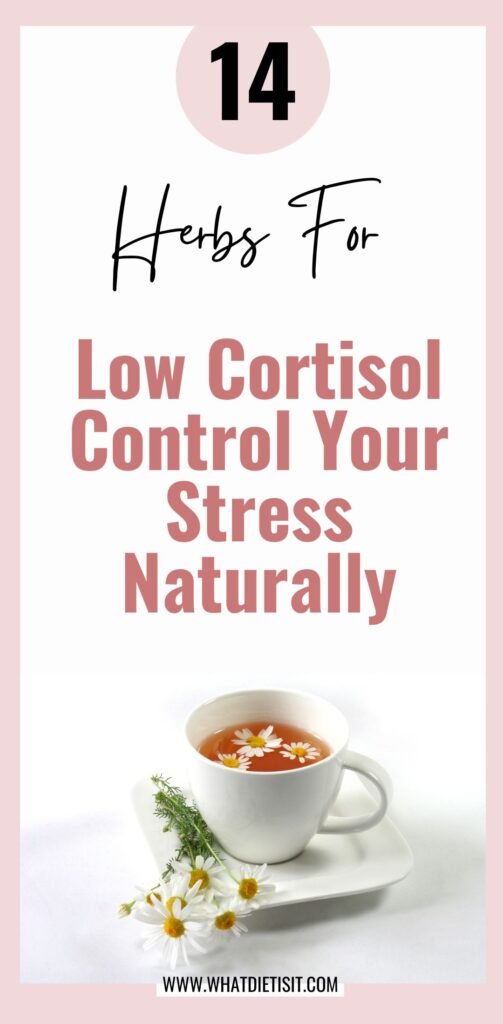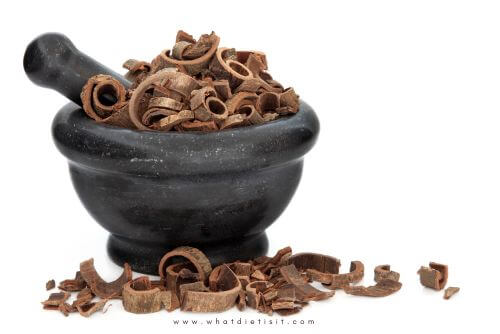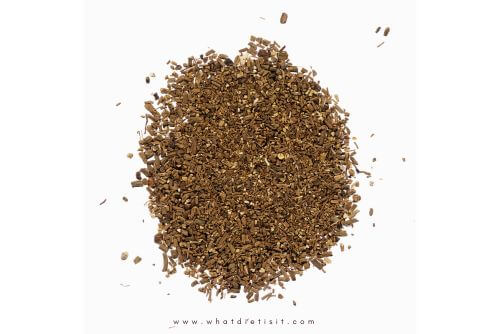If you’re searching for natural ways to reduce stress and support hormone balance, herbs for low cortisol may be just what you need. Research shows that up to 77% of Americans experience physical symptoms of stress, and high cortisol levels are often to blame. Incorporating herbs for low cortisol—like ashwagandha, holy basil, and rhodiola—can help lower stress naturally and improve overall well-being. In this article, you’ll discover 14 powerful herbs that may help you manage stress and keep your cortisol levels in check.
Contents
- 1 How Herbs Can Help Lower Cortisol
- 2 Ashwagandha
- 3 Holy Basil (Tulsi)
- 4 Rhodiola Rosea
- 5 Lemon Balm
- 6 Schisandra
- 7 Licorice Root
- 8 Ginseng
- 9 Magnolia Bark
- 10 Reishi Mushroom
- 11 Lavender
- 12 Chamomile
- 13 Valerian Root
- 14 Passionflower
- 15 Tips for Safely Using Herbs for Low Cortisol
- 16 Frequently Asked Questions
- 16.1 Can herbs for low cortisol interact with medications?
- 16.2 How long does it take for herbs for low cortisol to work?
- 16.3 Can you take more than one herb for low cortisol at the same time?
- 16.4 Are there any side effects to using herbs for low cortisol?
- 16.5 Is it safe to use herbs for low cortisol during pregnancy or breastfeeding?
- 17 Conclusion
How Herbs Can Help Lower Cortisol
Herbs can help lower cortisol by supporting the body’s natural stress response and promoting balance within the endocrine system. Certain herbs—often called adaptogens—work by helping your body adapt to physical and emotional stress, which can prevent excessive spikes in cortisol, the primary “stress hormone.”
Adaptogenic herbs like ashwagandha, rhodiola, and holy basil are known for their ability to calm the nervous system and regulate hormone production. They may help reduce anxiety, improve sleep, and support a sense of overall well-being. Other herbs, such as lemon balm and chamomile, have soothing properties that can promote relaxation and lower stress, which indirectly helps keep cortisol in check.
By regularly including these herbs for low cortisol in your routine—alongside a healthy lifestyle—you may find it easier to manage stress, maintain energy levels, and support long-term hormonal balance.
Ashwagandha
If you’re feeling overwhelmed by stress or struggling to find calm in your daily life, ashwagandha might be just what you need. This ancient herb, used for centuries in Ayurvedic medicine, has become a favorite for people looking to naturally support their body’s stress response. Here’s why you might want to consider adding ashwagandha to your routine:
Helps Lower Cortisol
Ashwagandha is well-known for its ability to help lower cortisol—the body’s main stress hormone. If you deal with chronic stress or anxiety, this herb can help your body stay balanced and resilient.
Supports Energy and Focus
Are you feeling drained or mentally foggy? Ashwagandha may boost your energy levels and mental clarity, so you feel more alert and focused throughout the day.
Promotes Restful Sleep
If stress is keeping you up at night, ashwagandha’s calming properties might help you relax and enjoy deeper, more restful sleep.
Enhances Overall Well-Being
By helping you manage stress, improve sleep, and maintain steady energy, ashwagandha supports your whole-body wellness so you can show up as your best self every day.
Holy Basil (Tulsi)

If you’re searching for a natural way to find calm and restore balance, holy basil—also known as tulsi—could be your new go-to herb. Used for centuries in traditional Indian medicine, holy basil is celebrated for its ability to help the body adapt to stress and promote a sense of well-being. Here’s how tulsi can support your journey to lower cortisol and better health:
Naturally Reduces Stress Hormones
Holy basil helps your body regulate cortisol levels, so you can bounce back from stressful days and feel more emotionally balanced.
Boosts Immunity
If stress often leaves you run down, Tulsi may help strengthen your immune system, keeping you healthier and more resilient.
Supports Mental Clarity
Feeling scattered or anxious? Holy basil can help promote clear thinking and a calmer mind, making it easier to focus on what matters.

Promotes Relaxation Without Drowsiness
Unlike some calming herbs, tulsi can help you unwind and relax without making you feel sleepy, so it’s great for daytime use.
Adding holy basil to your routine could be a gentle and effective way to support your body’s stress response and encourage a sense of calm, focus, and overall well-being. Always check with your healthcare provider before trying new herbs to make sure they’re right for you.
Rhodiola Rosea
If you’re feeling worn out by life’s pressures or want a natural boost to help you manage stress, Rhodiola Rosea might be just what you’re looking for. This hardy herb, traditionally used in cold climates like Siberia and Scandinavia, is known for its adaptogenic powers—helping your body cope with both physical and mental stress. Here’s how Rhodiola Rosea can help you on your journey to lower cortisol:
Fights Fatigue and Increases Energy
If you’re constantly feeling tired or sluggish, Rhodiola Rosea may help revive your energy levels and keep you going strong throughout the day.
Helps Balance Cortisol
Rhodiola is especially valued for its ability to help regulate cortisol. It can keep those stress hormones in check so you feel less overwhelmed and more in control.
Improves Mental Performance
Struggling with concentration or memory during stressful times? Rhodiola has been shown to support better focus, memory, and mental sharpness—perfect for busy days.
Uplifts Mood
Many people notice a brighter, more balanced mood after using Rhodiola Rosea, making it a great ally for emotional resilience during tough times.
Lemon Balm
If you’re looking for a gentle, natural way to unwind after a stressful day, lemon balm might be just what you need. This fragrant herb, loved for its fresh citrusy scent, has a long history of helping people find calm and balance. Here’s how lemon balm can support your efforts to lower cortisol and feel your best:
Promotes Relaxation and Eases Anxiety
Lemon balm is widely used to help calm the mind and soothe anxiety, making it easier to cope with life’s daily stressors.
Supports Better Sleep
If stress and racing thoughts keep you up at night, lemon balm’s gentle calming effects can help you drift off more easily and enjoy deeper, more restful sleep.
Naturally Supports Lower Cortisol
Lemon balm may help the body keep cortisol levels in check by calming the nervous system and promoting a sense of peace.
Gentle and Pleasant to Use
Whether you sip it as a soothing tea or take it as a supplement, lemon balm is a pleasant, natural way to add a little tranquility to your routine.
🌿 Ready to take control of your cortisol levels?
Explore the benefits of CortiSync here and see how it can complement your low cortisol meal plan.
Schisandra
If you want to support your body’s natural resilience to stress while boosting your energy and mental clarity, schisandra could be a powerful addition to your wellness routine. This unique berry, long used in traditional Chinese medicine, is packed with antioxidants and is known as an adaptogen—meaning it helps your body adapt to physical and emotional stress. Here’s how schisandra can help you manage cortisol and thrive:
Helps Regulate Cortisol and Stress Response
Schisandra supports the body’s ability to balance cortisol levels, making it easier to bounce back from stressful situations and feel more in control.
Boosts Energy and Stamina
Feeling worn out? Schisandra is valued for its ability to increase vitality and reduce feelings of fatigue, so you can stay energized throughout the day.
Supports Mental Clarity and Focus
When stress clouds your thinking, schisandra may help sharpen your mind, improve concentration, and support better memory.
Protects the Body With Antioxidants
Schisandra berries are rich in antioxidants, which help defend your cells against damage from stress and support overall wellness.
Check out our latest posts:
- How to Stop Period Cravings: Science-Backed Ways to Control PMS Hunger
- Female 7-Day Smoothie Weight Loss Diet Plan For Women: Free Smoothies Real Benefits
- Keto Cycle Diet Plan: How It Compares to Carb Cycling and Who Should Use It
- 10 Oatmeal Smoothie Weight Loss Recipes (Drinkable, Filling Blends for Busy Mornings)
- 5 Day Sugar Cleanse: A Simple Reset to Cut Cravings and Feel More Energized
Licorice Root
If you’re searching for a traditional herb to support your adrenal health and help manage stress, licorice root might be worth a closer look. Used for centuries in both Eastern and Western herbal medicine, licorice root is known for its unique ability to help regulate cortisol and provide extra support during times of fatigue or emotional strain. Here’s why licorice root could be a smart addition to your stress-relief toolkit:
Supports Healthy Cortisol Levels
Licorice root can help your body maintain steady cortisol levels, making it especially helpful if you’re feeling run-down or chronically stressed.
Boosts Energy and Reduces Fatigue
If you often feel tired or worn out, licorice root may give your adrenal system the gentle lift it needs to restore energy and vitality.
Soothes the Digestive System
Beyond its effects on stress, licorice root has soothing properties that can help calm indigestion or discomfort caused by tension.
Use With Care
It’s important to know that licorice root isn’t right for everyone. Overuse can cause side effects like high blood pressure, so it’s best to use it under the guidance of a healthcare professional—especially if you have heart or kidney concerns.
Adding licorice root to your wellness routine could help you manage stress more effectively, but always consult your healthcare provider before starting, to make sure it’s a safe choice for you.
Ginseng
If you’re looking for an herbal boost to help you handle stress and stay energized, ginseng could be the answer. This classic adaptogen has been treasured for centuries in both Asian and Western herbal traditions. Ginseng is renowned for its ability to help the body adapt to stress, support mental performance, and even keep cortisol levels balanced. Here’s how ginseng might benefit you:
Balances Cortisol and Reduces Stress
Ginseng can help regulate your body’s stress response, making it easier to keep cortisol levels in check during busy or overwhelming times.
Increases Energy and Stamina
Feeling worn out or low on energy? Ginseng is famous for boosting vitality and helping you fight fatigue, so you can stay active and productive.
Supports Mental Focus
If stress leaves you feeling scattered, ginseng may improve your concentration, memory, and overall mental sharpness, so you can tackle your day with clarity.
Promotes Overall Wellness
In addition to its stress-busting effects, ginseng contains antioxidants and immune-supporting compounds that help you stay healthy and resilient.
By incorporating ginseng into your daily routine, you may find it easier to cope with stress and maintain steady energy and focus. As with all herbs, check with your healthcare provider before starting ginseng—especially if you take medications or have underlying health concerns.
Magnolia Bark

If you’re searching for a natural way to relax and support balanced cortisol levels, magnolia bark could be just what you need. Used for centuries in traditional Chinese medicine, magnolia bark is celebrated for its calming effects and ability to help your body adapt to stress. Here’s how magnolia bark might benefit you:
Calms the Mind and Body
Magnolia bark contains compounds that help soothe the nervous system, making it easier to unwind and manage everyday stress.
Supports Healthy Cortisol Levels
By reducing anxiety and encouraging relaxation, magnolia bark can help lower elevated cortisol levels, especially if stress tends to get the better of you.
May Improve Sleep Quality
If stress or tension keeps you awake at night, magnolia bark’s calming properties may help you fall asleep more easily and enjoy deeper, more restorative rest.
Gentle Yet Effective
Magnolia bark is known for being both gentle and effective—making it a great option if you want natural stress relief without feeling overly sedated.
Adding magnolia bark to your wellness routine could be a helpful step toward managing stress and keeping cortisol levels balanced. As always, consult your healthcare provider before starting any new herbal supplement, especially if you’re taking medications or have health conditions.
Reishi Mushroom
If you’re looking to support your stress response and boost your overall wellness, reishi mushroom could be a valuable addition to your daily routine. Known as the “mushroom of immortality” in traditional Chinese medicine, reishi is famous for its adaptogenic properties and ability to promote balance within the body. Here’s how reishi mushroom can help you manage cortisol and feel your best:
Helps Regulate Cortisol and Reduce Stress
Reishi mushroom works as an adaptogen, helping your body cope with physical and emotional stress and maintain healthy cortisol levels.
Supports Immune Health
Not only does reishi support stress relief, but it also contains unique compounds that may enhance immune function, keeping you more resilient to illness.
Encourages Better Sleep
If you have trouble relaxing at night, reishi mushrooms’ calming effects may help improve your sleep quality so you wake up refreshed.
Promotes Overall Well-Being
With regular use, many people find that reishi mushroom boosts their mood, reduce fatigue, and helps them feel more balanced throughout the day.
By incorporating reishi mushroom into your wellness plan, you’re choosing a natural, time-tested way to support stress management, cortisol balance, and whole-body health. As always, check with your healthcare provider before starting any new supplement, especially if you have medical conditions or take prescription medications.
Lavender
If you crave more calm in your day and want a natural way to ease stress, lavender might be the perfect herb for you. Well-known for its soothing aroma and gentle effects, lavender has been used for centuries to help relax the mind and body. Here’s how lavender can support your goal of lowering cortisol and feeling your best:
Promotes Relaxation and Stress Relief
Lavender is famous for its ability to calm nerves and create a peaceful atmosphere, whether used as an essential oil, tea, or supplement.
Supports Healthy Cortisol Levels
By easing anxiety and promoting relaxation, lavender can help reduce your body’s production of cortisol, especially during stressful times.
May Improve Sleep Quality
If you struggle with restless nights, lavender can help you unwind and fall asleep more easily, making it a favorite for bedtime routines.
Versatile and Easy to Use
Lavender can be enjoyed in many forms—aromatherapy, tea, bath soaks, or even as a gentle supplement—so you can find what works best for you.
Adding lavender to your daily routine can bring a sense of calm and balance, supporting lower cortisol levels and overall well-being. As always, check with your healthcare provider before using new herbs, especially if you have any health conditions or are taking medication.
🌿 Ready to take control of your cortisol levels?
Explore the benefits of CortiSync here and see how it can complement your low cortisol meal plan.
Chamomile
If you’re searching for a gentle, time-tested way to calm your mind and ease daily stress, chamomile might be just what you need. This soothing herb has been cherished for generations as a natural remedy for relaxation and sleep support. Here’s how chamomile can help you manage cortisol and feel more balanced:
Eases Stress and Promotes Calm
Chamomile is widely known for its calming properties, helping to relax your nervous system and reduce feelings of anxiety after a long day.
Supports Lower Cortisol Levels
By encouraging relaxation and stress relief, chamomile can naturally help bring down elevated cortisol levels, making it easier for your body to recover from stress.
Aids Restful Sleep
If you struggle with falling or staying asleep, a cup of chamomile tea before bed can help you unwind and improve your sleep quality.
Gentle and Well-Tolerated
Chamomile is safe and easy to use for most people—whether enjoyed as a tea, capsule, or extract—making it a favorite for those seeking mild, natural support.
Incorporating chamomile into your routine can help you create a peaceful daily ritual, supporting both lower cortisol and a greater sense of calm. As always, consult your healthcare provider before starting any new herbal remedies, especially if you have allergies or take other medications.
Valerian Root

If you’re looking for a natural solution to unwind and support your body’s stress response, valerian root might be worth trying. This herb has been used for centuries to help calm the mind, improve sleep, and ease nervous tension. Here’s how valerian root can help you lower cortisol and feel more at peace:
Promotes Relaxation and Reduces Anxiety
Valerian root is well-known for its calming effects on the nervous system, making it easier to relax during stressful moments.
Supports Healthy Cortisol Levels
By helping you manage anxiety and stress, valerian root can play a role in keeping your body’s cortisol production in balance.
Improves Sleep Quality
If stress keeps you tossing and turning at night, valerian root is often used to support deeper, more restful sleep, so you can wake up feeling refreshed.
Gentle, Natural Option
Valerian root is considered a gentle and natural alternative to sleep aids or anti-anxiety medications, and it’s available as tea, capsules, or tinctures.
Adding valerian root to your wellness routine can be a simple, natural way to help your body cope with stress and maintain balanced cortisol levels. As always, check with your healthcare provider before starting any new herbal supplement, especially if you’re taking other medications or have ongoing health concerns.
Passionflower
If you’re seeking a gentle, natural way to ease your mind and support stress relief, passionflower could be a wonderful herb to explore. Treasured for its calming effects, passionflower has a long history in traditional herbal medicine for helping people find tranquility and balance. Here’s how passionflower can support your goal of lowering cortisol and feeling your best:
Calms the Mind and Reduces Anxiety
Passionflower is famous for its soothing properties, making it a go-to for those feeling anxious or mentally restless during stressful times.
Supports Lower Cortisol Levels
By promoting relaxation and reducing nervous tension, passionflower may help keep your body’s cortisol production in check, especially during periods of chronic stress.
Encourages Better Sleep
If worry or overthinking disrupts your sleep, passionflower can help you relax and drift off more easily, supporting deeper and more restorative rest.
Gentle and Non-Habit Forming
Passionflower is a natural, non-habit-forming option that can be taken as tea, tincture, or capsule, offering flexibility for your personal wellness routine.
Incorporating passionflower into your daily life can be a simple and effective way to support calm, balanced cortisol, and a peaceful mindset. Always consult your healthcare provider before starting any new herb, especially if you’re taking medications or managing health conditions.
Tips for Safely Using Herbs for Low Cortisol
Using herbs for low cortisol can be beneficial, but it’s important to use them safely and responsibly. Here are some practical tips to help you get started:
Consult a Healthcare Professional
Talk to your doctor or a qualified herbalist before starting any new herbs, especially if you have existing health conditions or take medication.
Start With One Herb at a Time
Introduce just one herb for low cortisol at a time so you can watch for any side effects or reactions.
Follow Recommended Dosages
Stick to the dosage instructions on the product label or those given by your healthcare provider. More isn’t always better and could increase the risk of side effects.
Watch for Allergic Reactions
Monitor your body for signs of allergies, such as rash, itching, or digestive discomfort. Stop use and seek advice if you experience any negative reactions.
Avoid Mixing With Alcohol or Certain Medications
Some herbs for low cortisol can interact with alcohol, sedatives, or prescription drugs. Check for potential interactions before combining.
Use Quality, Reputable Products
Choose supplements from trusted brands that have third-party testing to ensure purity and potency.
Monitor Your Progress
Keep track of how you feel after starting an herb for low cortisol. Adjust your routine with the guidance of a healthcare professional as needed.
By following these tips, you can safely incorporate herbs for low cortisol into your wellness routine and support a balanced, healthy lifestyle.
Frequently Asked Questions
Can herbs for low cortisol interact with medications?
Yes, some herbs for low cortisol can interact with prescription medications, including antidepressants, blood pressure medicine, and diabetes drugs. It’s important to talk to your healthcare provider before starting any new herbs to avoid unwanted side effects.
How long does it take for herbs for low cortisol to work?
The effects of herbs for low cortisol can vary. Some people notice a difference in a few days, while for others it might take several weeks of consistent use to see benefits.
Can you take more than one herb for low cortisol at the same time?
Many people combine herbs for low cortisol, but it’s best to start with one and see how your body responds. Combining several herbs should be done with caution and ideally under the guidance of a healthcare professional.
Are there any side effects to using herbs for low cortisol?
Most herbs for low cortisol are well-tolerated when used as directed, but some may cause mild digestive upset, headaches, or allergic reactions in sensitive individuals.
Is it safe to use herbs for low cortisol during pregnancy or breastfeeding?
Most herbs for low cortisol have not been proven safe for use during pregnancy or breastfeeding. If you are pregnant or nursing, consult your doctor before using any herbal supplements.
Conclusion
In conclusion, herbs for low cortisol offer a natural and effective way to help your body manage stress and maintain healthy hormone levels. By adding herbs for low cortisol like ashwagandha, holy basil, or rhodiola to your daily routine—alongside healthy lifestyle choices—you can support your well-being and feel more balanced. Remember to consult your healthcare provider before starting any new herbal supplements to make sure they’re right for you. Choosing the right herbs for low cortisol could be a simple step toward a calmer, healthier life.
